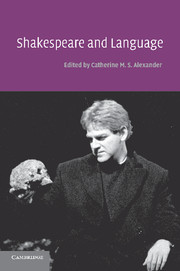Book contents
- Frontmatter
- Contents
- List of contributors
- Editor's note
- 1 Shakespeare and language: an introduction
- 2 Shakespeare's language and the language of Shakespeare's time
- 3 The foundations of Elizabethan language
- 4 Shakespeare's talking animals
- 5 Some functions of Shakespearian word-formation
- 6 Shakespeare and the tune of the time
- 7 Shakespeare's Romeo and Juliet: the places of invention
- 8 Shakespeare's thematic modes of speech: Richard II to Henry V
- 9 Hamlet and the power of words
- 10 The art of the comic duologue in three plays by Shakespeare
- 11 Hamlet's ear
- 12 ‘Voice potential’: language and symbolic capital in Othello
- 13 The aesthetics of mutilation in Titus Andronicus
- 14 ‘Time for such a word’: verbal echoing in Macbeth
- 15 Household words: Macbeth and the failure of spectacle
- 16 Late Shakespeare: style and the sexes
- Index
9 - Hamlet and the power of words
Published online by Cambridge University Press: 15 December 2009
- Frontmatter
- Contents
- List of contributors
- Editor's note
- 1 Shakespeare and language: an introduction
- 2 Shakespeare's language and the language of Shakespeare's time
- 3 The foundations of Elizabethan language
- 4 Shakespeare's talking animals
- 5 Some functions of Shakespearian word-formation
- 6 Shakespeare and the tune of the time
- 7 Shakespeare's Romeo and Juliet: the places of invention
- 8 Shakespeare's thematic modes of speech: Richard II to Henry V
- 9 Hamlet and the power of words
- 10 The art of the comic duologue in three plays by Shakespeare
- 11 Hamlet's ear
- 12 ‘Voice potential’: language and symbolic capital in Othello
- 13 The aesthetics of mutilation in Titus Andronicus
- 14 ‘Time for such a word’: verbal echoing in Macbeth
- 15 Household words: Macbeth and the failure of spectacle
- 16 Late Shakespeare: style and the sexes
- Index
Summary
If the first law of literary and dramatic criticism is that the approach to a work should be determined by the nature of that work, then I take courage from the fact that Hamlet is a play in which, in scene after scene, fools tend to rush in where angels fear to tread. That such fools also tend to come to a bad end - to be stabbed behind the arras or summarily executed in England, ‘not shriving-time allowed’ - I prefer at this point not to consider.
The area into which I propose to rush is the language of Hamlet. The method of entry is eclectic. If there is any timeliness about the rush it is that - just as ten years or so ago King Lear was Our Contemporary - Hamlet is now coming to the fore as one of the inhabitants of No Man's Land. A recent book on Shakespeare's Tragic Alphabet speaks of the play being about ‘a world where words and gestures have become largely meaningless’, and even as long as twenty-five years ago an article on ‘The Word in Hamlet’ began by drawing attention to ‘the intensely critical, almost disillusionist, attitude of the play towards language itself’. Against these, I must confess a firm (and perhaps old-fashioned) belief that Hamlet, the play, belongs not so much in No Man's as in Everyman's Land: that it is a vision of the human condition realized in the whole visual and verbal language of the theatre with such intensity and gusto that from any point of view it becomes meaningless to call that language meaningless; and that in the play as a whole speech is something far more complex, with powers for good and ill, than the ‘words, words, words’ of Hamlet's disillusionment.
- Type
- Chapter
- Information
- Shakespeare and Language , pp. 151 - 178Publisher: Cambridge University PressPrint publication year: 2004



